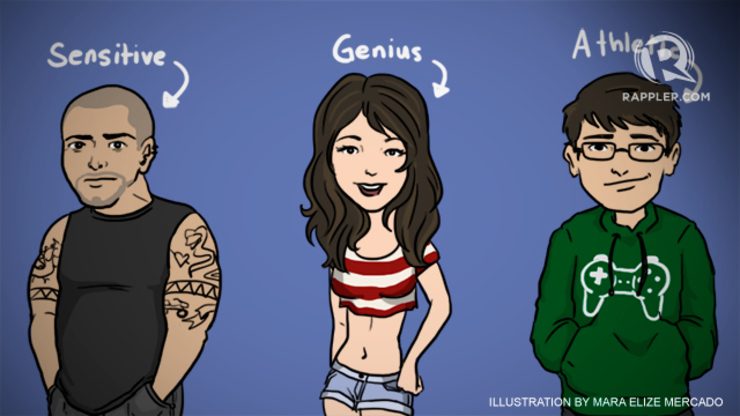SUMMARY
This is AI generated summarization, which may have errors. For context, always refer to the full article.

“They broke the mold when they made you.” We say that about people whose qualities seem rare and special. They are not “stereotypes”. But given that no two people are exactly alike, why do we persist in using stereotypes?
When we think of a commercial model or celebrity, we already have patterns of their characters and personalities in our head. It is the same when we think of older people, men in general or men in certain jobs (or sports cars), women in certain fields (or wearing certain outfits), students of certain schools or children of certain parents. It also happens when we are told of where people come from – countries or provinces. In sum, we have assumptions about everyone we know or know of even if we have not met them or gotten to know them better. Our perception is always stalked by stereotypes.
Having stereotypes does not make us evil. We have them because our brains are naturally wired to seek patterns – in everything – whether things or humans. Seeking patterns is a magnificently useful way to navigate everyday life. If we had to start from scratch all the time, we would not be able to do what we have to do in order to go through each task, each day of our dear lives. So if you have a pattern in your head of what a tropical forest is, a concrete jungle or a desert is, then you will be prepared for what could come up. That is certainly useful for survival.
Paul Bloom, a psychologist, who has also done extensive work on the moral sense of babies, gave a talk on why we create stereotypes. Watch it and you will be a little less harsh on yourself when you catch yourself initially but automatically invoking stereotypes.
But we also notoriously use “stereotypes” to figure out what we think of our fellow humans and we often stop there and let that stereotype dictate our whole view of a person or group of persons and trap it there for a long time. We even make important decisions based on those stereotypes. This is where we start to have serious problems.
“Stereotype” comes from “stereo” which is the Greek word for ‘solid” and “type” which is the French word for “plate”. In other words, a mold. When we use stereotypes, we are treating the complex, fickle, melodramatic humans that we all are as coming from an immovable, unchanging, unbreakable mold. Now, the problem becomes very clear.
The solutions to avoid thinking in terms of stereotypes are many and obvious but I found one writer who spoke so eloquently and clearly about the danger of a single story.
She is Chimamanda Ngozi Adichie, a Nigerian writer who reminded us that each of us carries a multitude of stories. Thus, to be judged only because we are of a certain age, parentage, country, or gender is, in her words, to “flatten” an entire life story. When she said that, the image that really came to me were first, the serial waves of the heartbeat of a person and then, the waves being squashed into a single straight line – a single story. It is an image that spelled the difference between life and death.
How do we then manage our natural tendencies to rely on stereotypes?
We should get to know people in their many nuances, whether individually or by groups. We should not simply look at their CVs or only rely on the news to tell us what we should think about other cultures, other people who are not like us. We should travel not just the tourist scenes but enter the inner lives of other cultures. I recently spent some time in Sri Lanka and dispelled all the stereotypical mess I had about it when I went there without an agenda but to simply be.
We should also read – many books of many kinds. I loved Muriel Barbery’s The Elegance of the Hedgehog. In her masterful management of irony, one of the main characters relied on what people thought she was (a “stereotypical” concierge) to carve a very deep and meaningful inner life for herself and the people she cared about.
We should also try to tell as many layers of stories hidden underneath the obvious. I think this is why I like Storyline. I get to “see” the complex human being behind the common job, the common lamentations about living in the Philippines, the common Filipino.
Stereotyping is being asked to explore another planet to say only that it is “kinda round like any other.” Every human being is a many-splendored story, changing, morphing. Discover a human and you beckon a new world. Stereotypes are for dummies. – Rappler.com
Add a comment
How does this make you feel?
There are no comments yet. Add your comment to start the conversation.